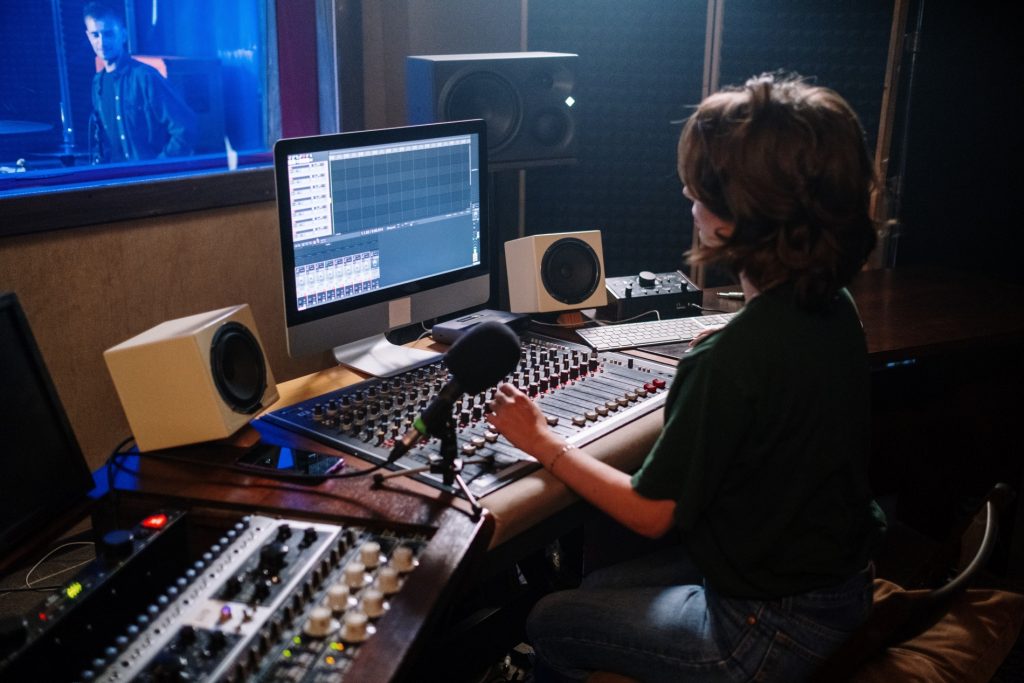Education & Career Trends: December 9
Curated by the Knowledge Team of ICS Career GPS

Excerpts are taken from an article published on makeuseof.com.
Technical jobs that operate behind the scenes in the creative arts industry are often overshadowed by their more popular visible counterparts. As a result, there is often a lack of information about dynamic careers like sound engineering.
What Is A Sound Engineer?
A sound engineer is an expert in bringing out the best form of audio by recording, mixing, manipulating and mastering it through mechanical processes. Also called audio engineering, this job requires equal creativity and technical expertise to create desired sound and effects. Whether working on a music album or covering a cricket match for live television, sound engineers work behind the scenes to ensure the quality, volume and tone of the recorded sound. They are also involved in the research and development of enhancing audio, alongside monitoring, recording, mixing and mastering sound in studios.
What Does A Sound Engineer Do?
Many sound engineers work in the music industry and they primarily record and master songs. While they are an essential part of the music industry, they also work in television, radio, film, games, sports, theatre, concerts, advertising and other fields.
Sound engineers work closely with other creative artists, like performers, actors, singers and sound designers, to understand their vision of music and execute it. In addition to setting up the audio equipment for recording, mixing or mastering, they also add sound effects, stabilisers, bass and other enhancers. After the recording or event, sound engineers are also responsible for dismantling the audio system and mastering the mixed and edited sounds to create a final complete audio version for further release or use.
What Are The Different Types Of Sound Engineering?
Depending on the chosen specialisation, sound engineers work in different roles and support different aspects of sound recording or processing:
- Studio recording: Recording with an artist or musician involves setting up audio equipment, individually recording different instruments, using distortions and filters to achieve the right effect and recording high-quality audio.
- Studio mixing: Mixing is when the recorded sounds are brought together to focus on the right instrument or audio source as per the theme of the intended audio.
- Studio mastering: This involves post-mixing processes to enhance and refine the sound for consistency. Sound master engineers are usually the last people to work on a recording before a studio approves it for replication and distribution.
- Digital games: Sound engineering in game studios involves adding theme music to video games and producing the right sound effects.
- Radio and broadcast television: For sporting events or on-ground news reporting, sound engineers are responsible for set-up, live audio sync and other technicalities to ensure the best sound quality.
- Live events: At live events like concerts and theatre, sound engineers ensure balance and control of sound, sound effects and live mixing. They need to ensure that each audience member experiences the sound and acoustics as the performer has envisioned.
What Is The Difference Between A Sound Engineer And A Sound Designer?
Many people assume that sound engineers and designers do the same work. While there is an overlap between the two roles, they are sufficiently different as well. Sound engineering relates to the more technical side of sound in recording sessions or during live events. A sound engineer must choose the right equipment, arrangement and instrument to ensure that the output is of the highest level possible.
The role of a sound designer, comparatively, is related to deciding the artistic direction of the soundtrack or theme of a particular project. Sound designers usually work with sound engineers to execute their vision and create the sound tone, quality and style. Sound designers also have an understanding of the technical aspects of the process. Both roles are complementary and work in collaboration for the best result.
What Are the Skills Needed To Be A Sound Engineer?
Here are some fundamental skills to develop to succeed as a sound engineer:
- Technical expertise: sound knowledge of subjects like physics and mathematics
- Troubleshooting: finding solutions to unforeseen equipment and soundscape challenges in foreign environments
- Communication and collaboration: working within a team of sound designers, artists and other creative people and effectively communicating with them
- Adaptability: being able to work in new environments on strict deadlines and under high pressure
- Quick learning: learning about new instruments, equipment and tools in a short period and applying that knowledge
- Attention to detail: having an ear that spots even the slightest noise, distortion or issues with sound
- Passion for audio or music: the ability to understand the power of sound, and possibly music, in creative arts and other industries
…
Have you checked out yesterday’s blog yet?
How to Deal With Workplace Burnout
(Disclaimer: The opinions expressed in the article mentioned above are those of the author(s). They do not purport to reflect the opinions or views of ICS Career GPS or its staff.)
Like this post? For more such helpful articles, click on the button below and subscribe FREE to our blog.




One Reply to “What is Sound Engineering?”